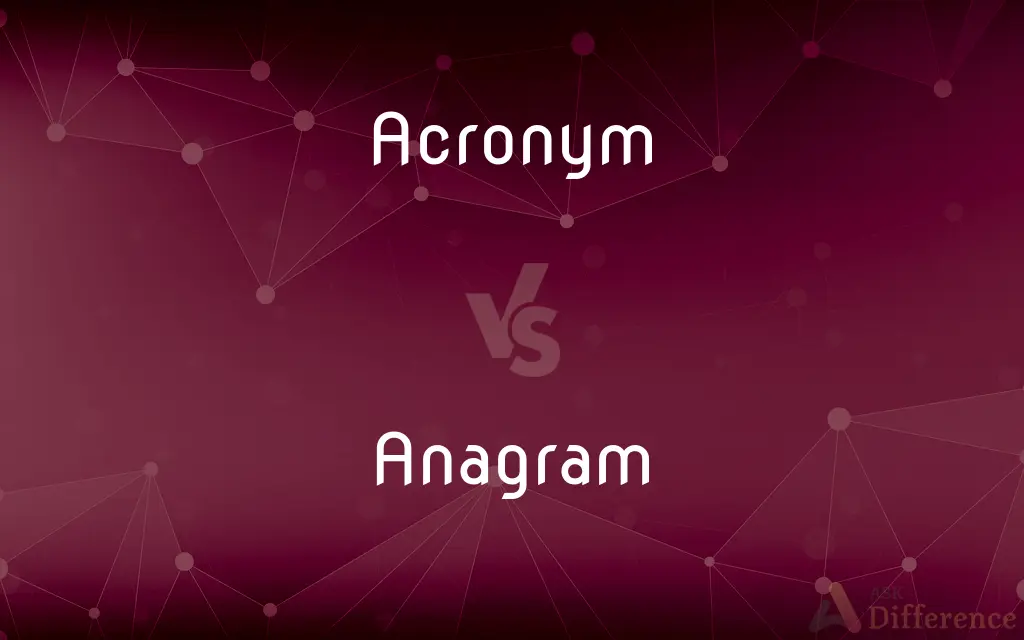Acronym vs. Anagram — What's the Difference?
Edited by Tayyaba Rehman — By Fiza Rafique — Updated on October 25, 2023
An acronym is formed from the initial letters of words in a phrase, e.g., NASA for "National Aeronautics and Space Administration." An anagram rearranges letters of a word to form another, e.g., "listen" to "silent."

Difference Between Acronym and Anagram
Table of Contents
ADVERTISEMENT
Key Differences
An acronym is a type of abbreviation made up of letters that stand for a sequence of words. An example of an acronym is "NASA," which stands for National Aeronautics and Space Administration. On the other hand, an anagram is a word or phrase formed by rearranging the letters of another word or phrase, typically using all the original letters exactly once.
Acronyms often serve the purpose of simplifying a longer term or phrase into a short, memorable abbreviation. For instance, "ATM" is an acronym for "Automated Teller Machine." Conversely, anagrams often serve as word puzzles or word plays. An example of an anagram is "dormitory" rearranged to "dirty room."
In the world of acronyms, you'll typically encounter them in institutional names, technical terms, and various fields to simplify terminologies. In contrast, anagrams are often seen in crosswords, games, literature, and sometimes in product names as a means of creative expression.
Acronyms are commonly used to shorten lengthy names or terms, making them easier to say or remember. "UNESCO" is an acronym for the "United Nations Educational, Scientific and Cultural Organization." Anagrams, meanwhile, might be used to conceal a word or to play with words in literature or poetry, such as "diagnose" rearranged to "is a gnode."
Comparison Chart
Definition
Abbreviation from initials of a phrase.
Word/phrase made by rearranging letters.
ADVERTISEMENT
Purpose
To shorten and simplify.
Wordplay or puzzles.
Example
NATO for "North Atlantic Treaty Organization."
"Earth" to "Heart."
Origin
Derived from Greek ‘akron’ (end) + ‘onym’ (name).
Derived from Greek ‘ana’ (back) + ‘gramma’ (letter).
Usage
Often in organizations' names, technical terms.
Crosswords, games, literature.
Compare with Definitions
Acronym
A word formed from the initial letters of a phrase.
SCUBA stands for Self-Contained Underwater Breathing Apparatus.
Anagram
A transformation of a word into another by interchanging its letters.
The word 'actor' becomes 'taroc' when anagrammed.
Acronym
A condensation of a series of words into a single term using their initials.
PIN stands for Personal Identification Number.
Anagram
A lexical recreation by shuffling the letters of a word.
The anagram of 'diaper' is 'repaid'.
Acronym
A representation of a name or term by using its initials.
NASA, representing National Aeronautics and Space Administration, is an acronym.
Anagram
A rearrangement of letters to form different words.
From 'listen' you can get the anagram 'silent'.
Acronym
A shortened form of a phrase using initial letters.
AIDS is an acronym for Acquired Immune Deficiency Syndrome.
Anagram
An anagram is a word or phrase formed by rearranging the letters of a different word or phrase, typically using all the original letters exactly once. For example, the word anagram itself can be rearranged into nag a ram, also the word binary into brainy and the word adobe into abode.
Acronym
An acronym is a word or name formed from the initial components of a longer name or phrase, usually using individual initial letters, as in NATO (North Atlantic Treaty Organization) or EU (European Union), but sometimes using syllables, as in Benelux (Belgium, Netherlands and Luxembourg), or a mixture of the two, as in radar (RAdio Detection And Ranging). Similarly, acronyms are sometimes pronounced as words, as in NASA or UNESCO, sometimes as the individual letters, as in FBI or ATM, or a mixture of the two, as in JPEG or IUPAC. The broader sense of acronym inclusive of terms pronounced as the individual letters (such as "TNT") is sometimes criticized, but it is the term's original meaning and is in common use.
Anagram
A word, phrase, or name formed by rearranging the letters of another, such as spar, formed from rasp.
Acronym
An abbreviation formed from the initial letters of other words and pronounced as a word (e.g. ASCII, NASA).
Anagram
A word or phrase formed by reordering the letters of another word or phrase, such as satin to stain.
Acronym
A word formed by combining the initial letters of a multipart name, such as NATO from North Atlantic Treaty Organization or by combining the initial letters or parts of a series of words, such as radar from radio detecting and ranging.
Anagram
Anagrams (used with a sing. verb) A game in which players form words from a group of randomly picked letters.
Acronym
Usage Problem An initialism.
Anagram
(of words) A word or phrase that is created by rearranging the letters of another word or phrase.
Acronym
(linguistics) An abbreviation formed by the initial letters of other words, sometimes exclusively such abbreviations when pronounced as a word (as "laser") rather than as individual letters (initialisms such as "TNT").
Anagram
To form anagrams.
Acronym
(linguistics) An abbreviation formed by the beginning letters or syllables of other words (as "Benelux").
Anagram
Literally, the letters of a word read backwards, but in its usual wider sense, the change of one word or phrase into another by the transposition of its letters. Thus Galenus becomes angelus; William Noy (attorney-general to Charles I., and a laborious man) may be turned into I moyl in law.
Acronym
To form into an acronym.
Anagram
To anagrammatize.
Some of these anagramed his name, Benlowes, into Benevolus.
Acronym
A word formed from the initial letters of a multi-word name
Anagram
A word or phrase spelled by rearranging the letters of another word or phrase
Acronym
An abbreviation consisting of the first letters of each word.
FBI is an acronym for Federal Bureau of Investigation.
Anagram
Read letters out of order to discover a hidden meaning
Anagram
A word or phrase formed by rearranging the letters of another.
The word 'alert' is an anagram of 'later'.
Anagram
A wordplay where letters are shuffled to create a new term.
The word 'evil' is an anagram of 'vile'.
Common Curiosities
Do Anagrams always make sense?
Not necessarily, but they often form real words or phrases.
What is an Anagram?
A word or phrase formed by rearranging the letters of another word or phrase.
How is an Acronym different from an abbreviation?
An acronym is pronounced as a word, while abbreviations might not be.
Are Anagrams limited to single words?
No, phrases can also be turned into anagrams.
Can an Acronym be formed from non-initial letters?
Traditionally, no. Acronyms are from initial letters, but some modern usages might vary.
Is finding Anagrams a skill?
Yes, some people excel in spotting and creating anagrams.
What is an Acronym?
An abbreviation formed from the initial letters of other words and pronounced as a word.
Why are Acronyms used?
To simplify long terms or names for easy reference.
Are Acronyms more formal than abbreviations?
Not necessarily; context dictates their formality.
Do all organizations have Acronyms?
No, but many do for simplicity.
Can any word be turned into an Anagram?
Most can, but not all will form meaningful results.
Can an Acronym form a meaningful word?
Yes, like RADAR which stands for "Radio Detection And Ranging."
What's a famous example of an Anagram?
"A decimal point" is an anagram for "I'm a dot in place."
Are Anagrams a form of wordplay?
Yes, they're often used in puzzles, literature, and games.
How are Anagrams created?
By rearranging the letters of a word or phrase.
What's a famous example of an Acronym?
"LASER" stands for "Light Amplification by Stimulated Emission of Radiation."
Share Your Discovery

Previous Comparison
Hiring vs. Recruitment
Next Comparison
Israel vs. JudahAuthor Spotlight
Written by
Fiza RafiqueFiza Rafique is a skilled content writer at AskDifference.com, where she meticulously refines and enhances written pieces. Drawing from her vast editorial expertise, Fiza ensures clarity, accuracy, and precision in every article. Passionate about language, she continually seeks to elevate the quality of content for readers worldwide.
Edited by
Tayyaba RehmanTayyaba Rehman is a distinguished writer, currently serving as a primary contributor to askdifference.com. As a researcher in semantics and etymology, Tayyaba's passion for the complexity of languages and their distinctions has found a perfect home on the platform. Tayyaba delves into the intricacies of language, distinguishing between commonly confused words and phrases, thereby providing clarity for readers worldwide.
















































